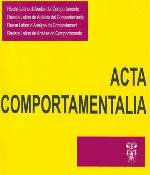Movements and causes. Manifesto for a naturalistic psychology
DOI:
https://doi.org/10.32870/ac.v5i1.18261Keywords:
psychology, causality.Abstract
<!-- /* Font Definitions */ @font-face {font-family:"MS Mincho"; panose-1:2 2 6 9 4 2 5 8 3 4; mso-font-alt:"MS 明朝"; mso-font-charset:128; mso-generic-font-family:modern; mso-font-pitch:fixed; mso-font-signature:-1610612033 1757936891 16 0 131231 0;} @font-face {font-family:"Cambria Math"; panose-1:2 4 5 3 5 4 6 3 2 4; mso-font-charset:0; mso-generic-font-family:roman; mso-font-pitch:variable; mso-font-signature:-1610611985 1107304683 0 0 159 0;} @font-face {font-family:Calibri; panose-1:2 15 5 2 2 2 4 3 2 4; mso-font-charset:0; mso-generic-font-family:swiss; mso-font-pitch:variable; mso-font-signature:-1610611985 1073750139 0 0 159 0;} @font-face {font-family:"\@MS Mincho"; panose-1:2 2 6 9 4 2 5 8 3 4; mso-font-charset:128; mso-generic-font-family:modern; mso-font-pitch:fixed; mso-font-signature:-1610612033 1757936891 16 0 131231 0;} /* Style Definitions */ p.MsoNormal, li.MsoNormal, div.MsoNormal {mso-style-unhide:no; mso-style-qformat:yes; mso-style-parent:""; margin-top:0cm; margin-right:0cm; margin-bottom:10.0pt; margin-left:0cm; line-height:115%; mso-pagination:widow-orphan; font-size:11.0pt; font-family:"Calibri","sans-serif"; mso-ascii-font-family:Calibri; mso-ascii-theme-font:minor-latin; mso-fareast-font-family:"MS Mincho"; mso-hansi-font-family:Calibri; mso-hansi-theme-font:minor-latin; mso-bidi-font-family:"Times New Roman"; mso-bidi-theme-font:minor-bidi; mso-fareast-language:EN-US;} .MsoChpDefault {mso-style-type:export-only; mso-default-props:yes; mso-ascii-font-family:Calibri; mso-ascii-theme-font:minor-latin; mso-fareast-font-family:"MS Mincho"; mso-hansi-font-family:Calibri; mso-hansi-theme-font:minor-latin; mso-bidi-font-family:"Times New Roman"; mso-bidi-theme-font:minor-bidi; mso-fareast-language:EN-US;} .MsoPapDefault {mso-style-type:export-only; margin-bottom:10.0pt; line-height:115%;} @page Section1 {size:612.0pt 792.0pt; margin:70.85pt 3.0cm 70.85pt 3.0cm; mso-header-margin:36.0pt; mso-footer-margin:36.0pt; mso-paper-source:0;} div.Section1 {page:Section1;} -->Both words in the title of this article are clearly related to Aristotelian thought. Nevertheless, they are still useful to understand present day scientific activity. Psychological explanation is reconsidered, underlying the need to distinguish three different movements ---qualitative, quantitative and evolutive, as welI as different causes as types of dependence-relation. This alIows to represent the functions of different movements in its singularity and interrelation. In reconsidering the concepts of movement and cause, in terms of a manifesto, a general functional scheme of psychological phenomena is proposed. The relevance of the concept of association as a general descriptor of psychological events is emphasized, as welI as the need of taking biological reactions -not the stimulus and response- as the elements of psychological association. It is also suggested the relevance of developing the final dependence in the description of psychological events as qualitative behavior. Field factors are stressed in relation to quantitative changes, in agreement withe Gestalt and Interbehavioral field models. FinalIy, evolutive movement is relevant to the development of efficient determinations in psychology.
Downloads
Downloads
How to Cite
Issue
Section
License

<a rel="license" href="http://creativecommons.org/licenses/by-nc-sa/4.0/"><img alt="Licencia de Creative Commons" style="border-width:0" src="https://i.creativecommons.org/l/by-nc-sa/4.0/88x31.png" /></a><br />Este obra está bajo una <a rel="license" href="http://creativecommons.org/licenses/by-nc-sa/4.0/">licencia de Creative Commons Reconocimiento-NoComercial-CompartirIgual 4.0 Internacional</a>.






